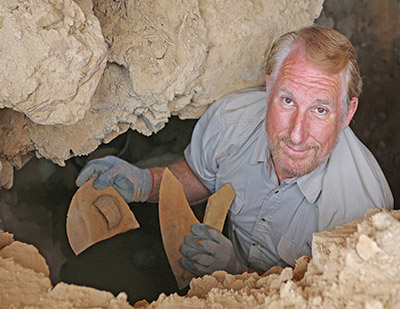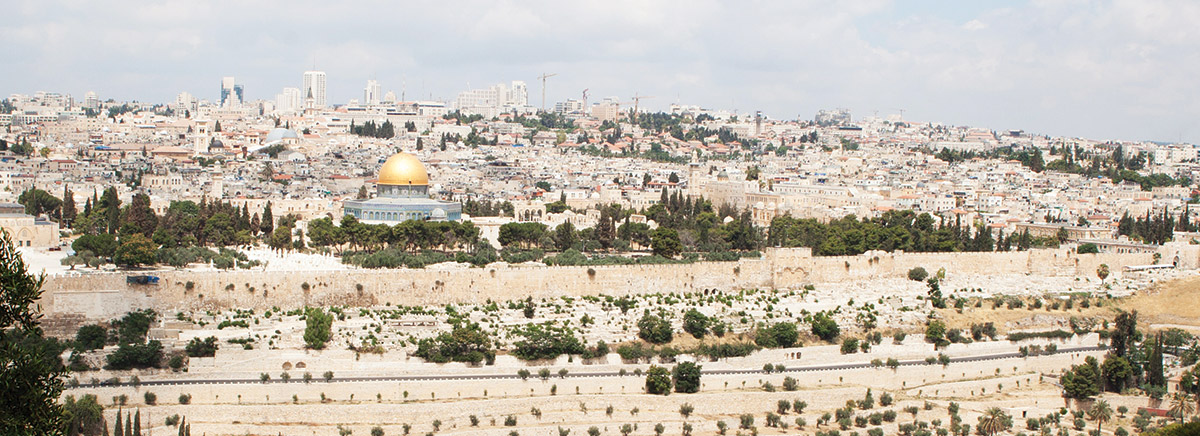
Dr. Randall Price removes fragments of storage jars that held the Dead Sea Scrolls.
My wife and I were graduate students at the Hebrew University of Jerusalem when our daughter was born at nearby Hadassah Hospital. We were so proud, and we felt our kinship to the Land of Israel was nearly complete — until we went to the American Consulate in Jerusalem to get our daughter’s first U.S. Passport. The line designated for “country of birth” read “Jerusalem,” not “Israel.” When I inquired of a consulate official, I was told bluntly, “the U.S. does not recognize Jerusalem as part of Israel.”
It has now taken 70 years for the U.S. to officially change that policy and finally recognize Jerusalem as Israel’s capital. For many who are not apprised of the facts but have only heard political propaganda through the mainstream media, this act of recognition may seem troublesome. Some media have even explained it as President Trump’s attempt to reward pro-Israel evangelicals whom he credited with his election victory. So, let’s review the facts from historical, religious, and political perspectives.
Historically, Jerusalem became the capital of Israel by decree of King David 3,000 years ago, based on his understanding of God’s own choice. It has remained Israel’s capital ever since, and though other nations conquered and settled in the Land of Israel, none ever declared Jerusalem as their capital. Over the past 2,000 years, even during times of occupation and persecution, a Jewish community resided there and maintained it as their “eternal capital.”
In 1948, when the U.N. voted to partition Israel into Arab and Jewish states, Israel immediately reaffirmed Jerusalem as its capital and enshrined it in its national anthem, “Hatikvah” (“the Hope”): “As long as within our hearts the Jewish soul sings, as long as forward to the east to Zion looks the eye — our hope is not yet lost. It is two thousand years old, to be a free people in our land, the land of Zion and Jerusalem.”
However, during the 1948 War of Independence, Jordanian forces conquered and occupied the eastern part of Jerusalem containing the historic Jewish Quarter, the Temple Mount and Western Wall, Hebrew University, and Hadassah Hospital. In 1967, the Six-Day War restored this part of the city to Israel and Jerusalem was reunified. Every Israeli prime minister since has declared the city “the eternal and undivided capital of the Jewish State.” Sir Winston Churchill, recognizing the historical reality that no other people could restore Jerusalem to its former glory, remarked to British diplomat Evelyn Shuckburgh, “You ought to let the Jews have Jerusalem; it was they who made it famous.”
From a religious perspective, the Bible, which mentions Jerusalem more than any other place (about 800 times), states, “the Lord has chosen Jerusalem and will dwell there forever” (Psalm 132:13-14) and expressly calls upon God’s people to never forget Jerusalem and to “exalt it above their chief joy” (Psalm 137:5-6). There, Israel’s kings ruled and the Temples stood. Jerusalem was, and is, at the center of the prophets’ predictions of worldwide peace and blessing at the coming of the Messiah (Isaiah 2:2-4). For this reason, it was called “the City of the Great King” (Psalm 48:2), and Israel, uniquely, has guaranteed religious freedom and access to all religions in Jerusalem since it regained sovereignty in 1967.
Politically, the United States has continually acknowledged Jerusalem — despite its international status as a disputed city — as the capital of Israel. In 1992, President Bill Clinton said, “Jerusalem is the capital of Israel and must remain an undivided city.” The next year, he said he supported “the principle of moving the U.S. Embassy to Jerusalem.” In 1995, the U.S. Congress passed the “Jerusalem Embassy Act,” calling Jerusalem the undivided capital of Israel and requiring the embassy to be moved to Jerusalem by 1999. It was for this reason that George W. Bush, while still a candidate, said “as soon as I take office, I will move the U.S. Embassy to the city Israel has chosen as its capital.”
While this did not happen under the Bush administration, in 2008, President Barack Obama declared, “I have said Jerusalem is the capital of Israel and will remain so.” And, just six months ago, the U.S. Senate marked 50 years of Jerusalem’s reunification with a vote of 90-0 that the U.S. Embassy should be moved to Jerusalem and that it should remain the undivided capital of Israel. After all, Jerusalem is where the prime minister of Israel lives, where all of the government agencies are housed, where the Knesset (Israel’s parliament) sits, and where the Supreme Court presides.
Recognition of these facts by President Trump was nothing more than following through on the historical reality of the city, the religious precedent going back to biblical times, and the political intentions of the U.S. government and past presidents.
What will be the outcome? There has been, and will be, political protests by those who have sought to undermine these facts with their own revisionist view based on a religious agenda of supersessionism. There will continue to be condemnation from the politically biased United Nations General Assembly. However, the U.S. act of recognition serves the interest of renewing the peace process in the Middle East.
Israel has always demonstrated its willingness to reconcile political disputes with the Palestinians through direct negotiations. In recent years, the Palestinian Authority abandoned this process and sought to have its demands met through the United Nations. Formerly, the U.S., while promoting direct negotiations, abstained from recognizing Jerusalem — the major issue in this dispute — which emboldened the Palestinians to independent action. The U.S. move of its embassy to Jerusalem now strengthens the call to return to negotiations with Israel and to deal with historical and political facts.
As for my daughter, it now means she will get a new passport with a long-awaited change affirming that being born in Jerusalem means being born in Israel!
Dr. Randall Price teaches courses on biblical and Judaic studies as a distinguished research professor in the Rawlings School of Divinity. He has also had an extensive career as an archaeologist, serving as the director of excavations on the Qumran Plateau in Israel (site of the Dead Sea Scrolls community) since 2002. Price is the author or co-author of 30 books and has produced five films in Israel. He also leads annual tours to the Holy Land and is curator of the Liberty Biblical Museum, which houses many of the biblical artifacts he has collected throughout his career.
 Early last year, Dr. Randall Price and Liberty students and faculty helped to uncover evidence in a cave in Qumran, Israel, making Christianity Today’s Top 10 Discoveries of 2017 for Biblical Archaeology. The discovery of broken storage jars, scroll wrappings, string, and a piece of worked leather, as well as pickaxe heads from looters in the 1950s, proves the Dead Sea Scrolls were once stored there. It was the first major discovery related to the Dead Sea Scrolls in 60 years.
Early last year, Dr. Randall Price and Liberty students and faculty helped to uncover evidence in a cave in Qumran, Israel, making Christianity Today’s Top 10 Discoveries of 2017 for Biblical Archaeology. The discovery of broken storage jars, scroll wrappings, string, and a piece of worked leather, as well as pickaxe heads from looters in the 1950s, proves the Dead Sea Scrolls were once stored there. It was the first major discovery related to the Dead Sea Scrolls in 60 years.
Support for Israel
On Oct. 18, Liberty honored the culture, heritage, and accomplishments of past and present Jews during a Judeo-focused Convocation. Israeli worship band Miqedem led the crowd in a worship set sung entirely in Hebrew. Wayne Hilsden, founder and president of Fellowship Israel Related Ministries, delivered the message. Hilsden is co-founder of the King of Kings Community in Jerusalem, a Messiah-centered congregation that seeks to unify the faith-based community in Israel.
Liberty has continued to nurture a relationship with Israel. In February 2016, the university hosted Ron Dermer, Israel’s Ambassador to the United States. That spring, Liberty announced a financial investment in leading-edge development projects in the technology, medical, and defense industries in Israel.




